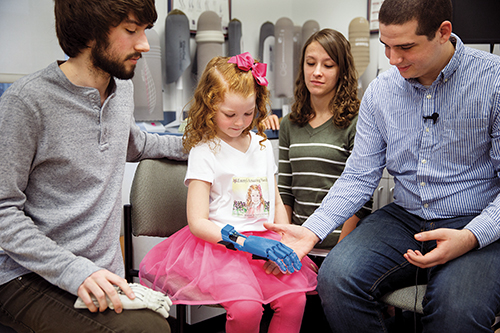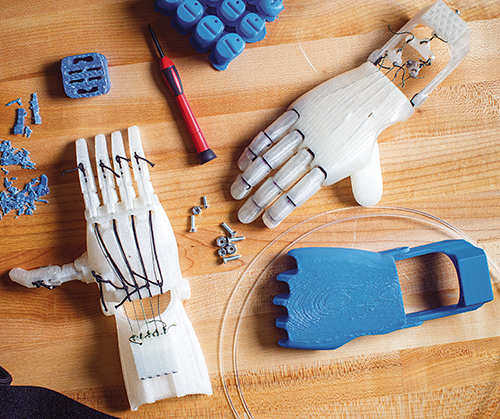Messiah engineering students venture into prosthetics
A 5-year-old girl gets ready to play outside. She slips on her sneakers, grabs her helmet and fastens on her hand. Yes, her hand.
Messiah’s engineering students have ventured into prosthetics, the design and construction of artificial limbs. Tim Gover ’17, Jessica Raboci ’17 and Jason Yoder ’17, under the direction of Biomedical Engineering Professor Emily Farrar ’10, created a prosthetic hand from the campus 3-D printer. Using an open-source design called Raptor Hand, the students downloaded the plans and began adapting it specifically for Emily “Emmy” Hoffman, who was born missing the fingers on her right hand.
First learning about the Raptor Hand design at a 2015 prosthetics conference, Farrar contacted a local prosthetist, Eric Shoemaker from Ability Prosthetics Orthotics in Mechanicsburg. She told him she had some key ingredients available: a 3-D printer and some engineering students looking for a project.Shoemaker, providing medical guidance and expertise, connected the Collab team with Emmy’s parents, who happen to be family friends of his, in Cheltenham, Pa.
“Students going into biomedical engineering love the idea of prosthetics, because it sounds like engineering of the human body,” said Farrar, “recreating a functional limb based on engineering principles to help someone. It fully encapsulates what biomedical engineering is.”
While Emmy had mastered many activities—catching a ball, unwrapping a cupcake, brushing her teeth—she needed both hands to hold the handlebars of a bicycle. To provide her with a prosthetic hand that gripped, the students ultimately graduated from the Raptor Hand design to the Flexy-Hand 2, designed by Steve Wood. The Flexy-Hand provided the compliant grip that Emmy needed, and the students further modified it for fit.
The Raptor Hand Project is just one of many organized through the Collaboratory, an internal non-profit organization of Messiah College that engineering students must participate in during the course of five semesters for class credit. The Collab provides the funding, mentorship and administrative oversight for the project, but the work is done by the students.
“I’m grateful for the opportunity that Messiah gives us,” said Raboci of the project, “to have a hands-on experience in an area of our field of engineering with others who have similar aspirations.”
The team, whose members received internship credit for the project, gathered anthropomorphic measurements and began the initial design. They visited the anatomy lab at Messiah to examine a cadaver’s ligament function and wrist movement, so they could mimic it in their structure. The prosthetic fingers move through motion detection in the gauntlet, located on the wrist portion of the prosthetic. Also, if Emily outgrows or breaks the prosthetic, it’s inexpensive and easy to print a new one.
“Doing this project has really shown me how to connect what I am learning in engineering and apply it to a real-world application,” said Gover.
Once the prototype was ready, the team presented it to Emmy at Ability’s Exton office for an initial fitting by Shoemaker March 25. After some tweaks, the students printed the final version pink—at Emmy’s request—and gave it to her April 22. Yoder even added her name with some hearts on the hand.
“I could see her eyes light up,” said Emmy’s mom Jocelyn Hoffman. “It made me smile. I felt like, ‘Oh she likes it! She’s not going to be embarrassed about it.’ When she had the option of choosing pink, that made her very happy.”
Now, Emmy will be able to reach the childhood milestone of riding a bike, thanks to Messiah’s engineering students.
“The encounter with Emily reinforced the career path in engineering I am headed on,” said Yoder. “Seeing a creation that I helped bring into fruition have an impact on another life was moving and humbling.”
Coincidentally, Emmy’s father Tom Hoffman ’96 graduated from Messiah with a degree in psychology and a minor in criminology, which led him to a career in federal law enforcement.
“Twenty years later,” he said, “my alma mater is still giving back—not just to me but to my daughter. I am very excited that the Collab students have adopted this project, and I hope they know they are truly making a difference in Emily’s quality of life.”
— Gabrielle Kurtz ’18

